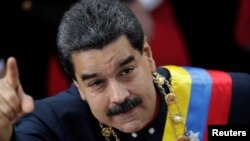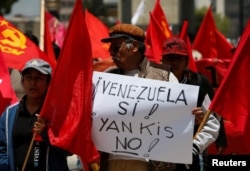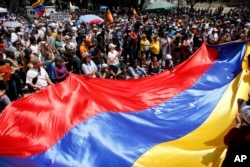U.S. President Donald Trump's talk of possible military action in Venezuela could be a political lifeline for the country's unpopular leader, who has long used the threat of U.S. aggression to justify policies that have shredded the economy.
President Nicolas Maduro has continued the free-spending socialist "revolution" started by his predecessor, the late Hugo Chavez, almost 20 years ago. Key to the populist rhetoric used by both is a constant drumbeat of warnings that the U.S. "empire" is planning an invasion to steal Venezuela's oil.
That threat was laughed off by the opposition and until Friday night, when Trump said a military option was not out of the question for dealing with the Venezuelan government's crackdown on the opposition and deepening social crisis.
"He's doing Maduro a favor by reinforcing the nationalist position that the Gringos want to come and attack Venezuela. This has always been part of Maduro's rhetoric, and Chavez before him. And it has served them both well," said lawyer Luis Alberto Rodriguez while sitting at a cafe, smoking a Cuban cigar, in one of Caracas' wealthier neighborhoods.
"It's not going to have any impact other than the government using it to further unify its people and attack the opposition," the 44-year-old added.
Maduro loyalists, who regularly insult opposition leaders as Washington's lackeys, wasted no time in pouncing.
"Mind your own business and solve your own problems, Mr. Trump!" thundered Maduro's son, also named Nicolas, at the country's new constituent assembly, which was elected last month to rewrite the constitution.
The opposition fears the assembly will remove any checks that remain on the president's powers, and critics globally have condemned it as an affront to democracy.
"If Venezuela were attacked, the rifles would arrive in New York, Mr. Trump," the younger Maduro said. "We would take the White House."
'No Greater Gift'
Marches against Maduro were held in Caracas on Saturday, with few confrontations with state security forces and no deaths. More than 120 have been killed in unrest since April, as the economy collapses deeper into a recession compounded by triple-digit inflation as well as food and medicine shortages.
The opposition's Democratic Unity coalition on Sunday issued a statement rejecting foreign threats to the country, without specifically identifying Trump or the United States.
"The Democratic Unity coalition rejects the use of force, or the threat of its use, by any country [against] Venezuela," said the statement published on the group's Twitter account.
The coalition added: "Venezuela has for years been militarily and politically intervened by Cuba," echoing opposition criticism that Maduro has allowed foreign allies to colonize Venezuela even has he decries U.S. imperialism.
The opposition, which controls a congress that has been neutered by Maduro's loyalist Supreme Court, boycotted last month's election of the new legislative superbody.
Opposition leaders called instead for an early presidential election, which Maduro would likely lose as his popularity gets pummeled by the country's economic woes.
"Maduro could not have asked for a greater gift from Trump," said David Smilde, senior fellow at the Washington Office on Latin America, a human rights think tank. "He provided substance for Maduro's heretofore implausible conspiracy theories."
Smilde said Trump's threat of military force put the Venezuelan opposition "on its heels" after a group of Latin American governments joined last week in reprimanding Maduro for sponsoring the July 30 election of the constituent assembly.
"It has threatened to deflate the emerging regional consensus regarding Venezuela," Smilde said. "Today the countries that on Tuesday signed on to a strong statement criticizing Maduro's authoritarian direction are spending their time criticizing Trump's statements."







